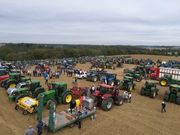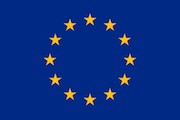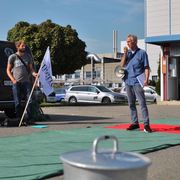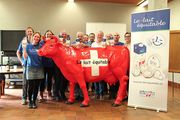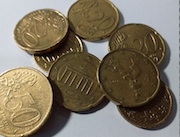In 2008 and 2009, milk producers, courageously and with a heavy heart, poured away the contents of their milk tanks to draw the world's attention to the absolute rock-bottom prices paid for milk.
Ciney, 16/09/2019: The major European milk delivery strikes of 2008 and 2009 were commemorated in numerous events held in France and Belgium throughout the weekend and this Monday as well. These milk strikes, which have gone down in history, led to milk producers in the EU moulding themselves into an extremely important political voice. A voice that was not fragmented and weak, but was a collective outcry that expressed the key concerns of very many European dairy farmers, loud and clear. A voice that might not have been able to ensure that everything that was necessary was implemented immediately, but has definitely put forth concrete proposals to improve conditions within the sector. These include the implementation of voluntary production cuts, which was an important political victory in 2016.
This weekend in France, participants in the 2009 strike from all over Europe made the start. In a large-scale festival in Normandy, they proudly commemorated the strong actions of ten years ago. Board member of the French milk producer organisation APLI and the European Milk Board (EMB), Boris Gondouin, commented: "This weekend we are here in Normandy, France, for the 10th anniversary of the milk strike. It was something magical, but at the same time it was very hard. It is something I don't wish to anyone. But it was essential and it showed everyone – decision-makers, consumers, other farmers – that we can be united. And that if we no longer agree with the price of milk, at some point we could stop delivering milk, on a European scale."
The European representatives of the milk producers then continued their journey to Ciney in Belgium to attend today's big rally with 1000 tractors. Just like 10 years ago, when 3 million litres of milk were poured on the fields, today milk producers from all over Europe have gathered here with tractors to demonstrate against the still unfair milk prices which do not cover their costs. They are joined by many farmers from other agricultural sectors who are also demonstrating against the current agricultural policy, which lacks fairness and sustainability.
EMB President and Belgian dairy farmer Erwin Schöpges says that the strikes were a very important, historic moment for milk producers in Belgium and in other countries. "It was a unique moment of solidarity between milk producers and consumers. Such an action had never taken place before and we were very proud to have taken this step." Sieta van Keimpema, EMB Vice-President, addresses the current generation of milk producers: "Look at what has happened on your farm in the last 10 to 20 years. Look at your income, the situation of your family, the hours you work and how social your life still is. If you see that your life hasn't gotten better, even though you've worked so much, join the farmers who want to change something. And that is in your interest, which also corresponds to the interest of many other international farmers. Fighting together is the only way to improve our situation and a way against the disappearance of dairy farms that we have seen for years. Stand up, all dairy farmers!"
In the eleven years since, the dairy sector has made progress. But we have also seen what happens when reactions are insufficient: drastic collapses in milk prices have continued to occur post the strikes as well. Family farms continue to disappear at an increasing rate, even though it is absolutely clear from a socio-political and an environmental point of view that these family structures are key. European dairy policy cannot do without a crisis instrument like the Market Responsibility Programme – an instrument that prevents such price collapses so that milk production does not become synonymous with a painful, loss-making venture. So that farming, once again, becomes an activity with prospects for the future – for farmers in general, and in particular for the youth. This was one of the objectives that motivated milk producers to go on strike in 2008 and 2009, and they continue to steadfastly pursue this objective even today.
In many European countries, those who participated in the milk strikes are looking back on these events and their significance for the current dairy-farmer movement in Europe.
France: Sylvain Louis, President of APLI
2009 was a wake-up call for dairy farmers, where they realised that their production belonged to them, that they could pour away their milk to show that the milk purchase price was totally insufficient. A new vocabulary was born: we started talking about production costs, cost-covering prices, decent wages, volume regulation. The years thereafter entailed an on-going struggle without any guarantee of success, but if you do not fight, you have lost the battle before it even began.
Germany: Stefan Mann, Chairman of BDM
What seemed impossible became a reality: We all look back fondly and proudly on the actions organised on our dairy farms 10 and 11 years ago. In late May 2008, our then Chairman and President Romuald Schaber stood in Freising before 15,000 farmers eagerly awaiting the go-ahead, and explained to them that from this moment on, they would withhold their milk deliveries. This was followed by nine emotionally-charged days filled with exemplary commitment and increasing bafflement on the dairy sector. We all went above and beyond, sleep was scarce, and in addition to the milk delivery strikes, the interruption of milk deliveries from other EU countries led to a very challenging situation for the committed protesters all over the country.
A year later, in autumn 2009, the second heated phase of the protest was rolled out – this time not in Germany alone, but together with our friends in neighbouring countries. The images were even more powerful; we need only to think about the large milk spraying action in Ciney.
Without these heated phases of protests by dairy farmers, we would no longer be talking about the issues plaguing the dairy sector. There would have been no Milk Package, no discussion about the future organisation of the dairy market, no dairy sector study by the Federal Cartel Office, no pioneering decisions by the Agriculture Committee of the European Parliament, and no debates about economically-sustainable dairy farming and so much more.
What began in 2008/2009 as an expression of outrage is something that we want to build on with our irrefutable arguments and our perseverance, which was initially considered impossible. Let us remain ever-ready to channel our anger into public demonstrations whenever needed!
Italy: Roberto Cavaliere, EMB Executive Committee member and President of the Italian association APL della Pianura Padana
We fought together for a fair price. The milk strikes were our reaction to an inadequate European policy. We withheld our production to demand fairer rules for the dairy market.
Luxembourg, LDB dairy farmers' association
A large number of farmers in Luxembourg were very motivated and joined the strike. Many poured away milk on their farms and just as many drove their tractors – tanks filled with milk – to the city and to Jean-Claude Juncker in the Ministry of State. The solidarity among dairy farmers was impressive, as was the solidarity shown by citizens for their dairy farmers. Many were willing to change their consumption habits and to be more conscious about what they buy. This is something that still prevails in Luxembourg: consumers ask for regional, seasonal products. All in all, a lot changed among dairy farmers 10 and 11 years ago. The fact that so many all across Europe were able to act in concert has left its mark on me.
Netherlands: Sieta van Keimpema, EMB Vice-President and Chairperson of the DDB
The resistance from cooperatives against their own members was extremely disappointing. However, the solidarity among the participating farmers was simply unbelievable
Austria: Ernst Halbmayr, Project manager at A faire Milch
I was there in June 2008 when thousands of dairy farmers gathered in a field in Freising, Germany, to hear Romuald Schaber declare: "I will not deliver any milk as of tomorrow." The same evening, we convened a Bureau meeting in Austria and decided to immediately join the action. For many, this was surely the most emotional moment of their lives as dairy farmers. For those who were not there in person, it is probably difficult to imagine how charged this period was. Today, everyone who was there clearly remembers what they did and has their own story to share about the event.
Switzerland: Werner Locher, Secretary of BIG-M
The milk strikes in Europe provided ample proof of the solidarity among farmers. Through a number of actions, it was possible for us to create awareness about the dysfunction of the dairy sector among the public at large. Unfortunately, the framework conditions have not changed significantly since then. The EMB is much needed, even today! We, Swiss farmers, are proud to be a part of the amazing European movement that is the EMB.
A voice that, in the eyes of many dairy farmers, could surely go on to even greater victories.
Photos of the rally in Ciney
EMB press release of 16 September 2019


